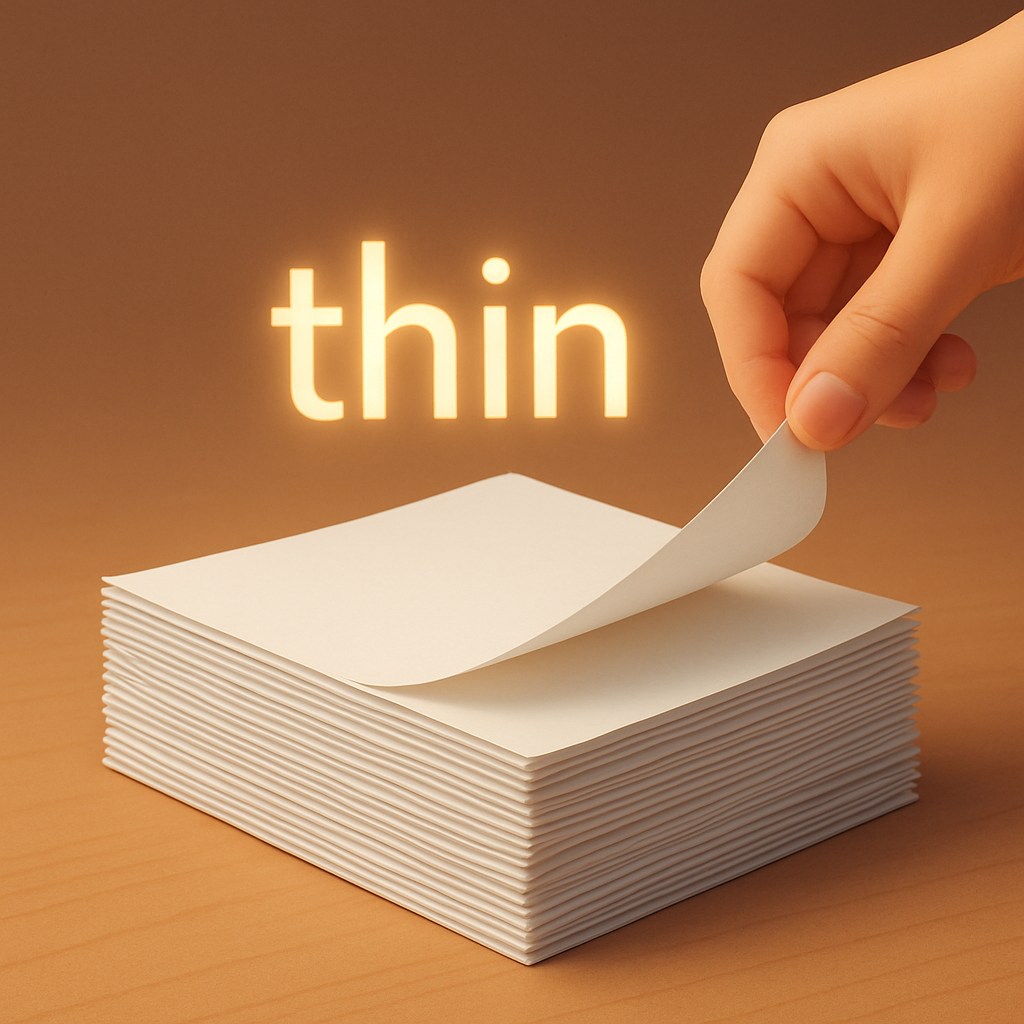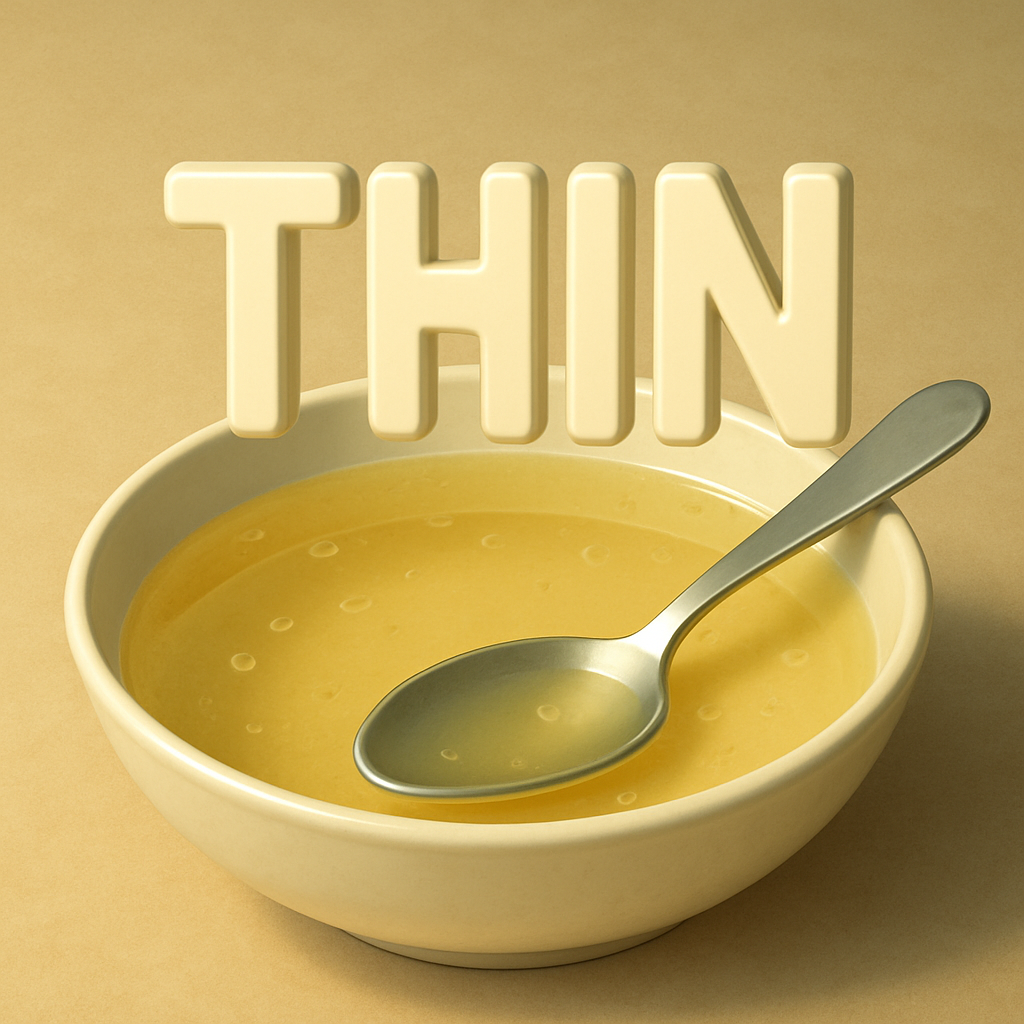Thin
Definition
Thin refers to having little thickness or depth; being narrow, fine, or not dense. It can describe physical dimensions, a sparse arrangement, or a weak concentration.
Parts of Speech
- Adjective
- Adverb
- Verb
Pronunciation
American English
- IPA Pronunciation: /θɪn/
- Respelling: THIN
British English
- IPA Pronunciation: /θɪn/
- Respelling: THIN
Etymology
The word "thin" originates from Old English "þynne," meaning "narrow or slender," derived from Proto-Germanic "*thunnuz" and Proto-Indo-European "*ten-" meaning "to stretch." It has retained its general sense throughout Middle English into Modern English.
Derivatives
- Thinner (noun/adjective)
- Thinness (noun)
- Thinning (noun/verb)
- Thinly (adverb)
- Thin-skinned (adjective)
Synonyms
- Slender
- Narrow
- Fine
Antonyms
- Thick
- Wide
- Dense
Usage
The word "thin" is used to describe the physical or metaphorical lack of thickness, density, or robustness. For example, "The ice was too thin to walk on," or "His argument was thin and lacked depth."
Related Terms
- Slim: Having a small width or slender appearance.
- Fine: Refers to something very small in diameter or density.
- Sparse: Describes a thin or scattered arrangement.
Detailed Definitions
Adjective
- Having little thickness or depth: Refers to something narrow or fine in measurement.
- Example: "The sheets of paper are very thin."
- Sparse or not dense: Refers to a light or minimal arrangement.
- Example: "The trees are planted in a thin row."
- Weak or diluted: Describes something lacking in concentration or strength.
- Example: "The soup was watery and thin."
Adverb
- In a thin or sparse manner: Refers to spreading something thinly or sparingly.
- Example: "The paint was applied too thin."
Verb
- To make or become thin: Refers to reducing thickness, density, or concentration.
- Example: "He thinned the paint to make it easier to apply."
- To reduce in number or frequency: Refers to making something less dense or crowded.
- Example: "The crowd thinned as the night wore on."
thin



🇨🇳 Chinese (Mandarin)
- 瘦
- IPA Pronunciation: /ʂoʊ̯/
- English respelling: shòu
- 薄
- IPA Pronunciation: /pɔ̂/
- English respelling: bó
🇮🇳 Hindi
- पतला
- IPA Pronunciation: /pətlaː/
- English respelling: patla
- दुबला
- IPA Pronunciation: /dʊbəlaː/
- English respelling: dubla
🇪🇸 Spanish
- Delgado
- IPA Pronunciation: /delˈɣaðo/
- English respelling: delgado
- Fino
- IPA Pronunciation: /ˈfino/
- English respelling: fino
🇫🇷 French
- Mince
- IPA Pronunciation: /mɛ̃s/
- English respelling: mince
- Fin
- IPA Pronunciation: /fɛ̃/
- English respelling: fin
🇸🇦 Arabic (Modern Standard Arabic)
- نحيل
- IPA Pronunciation: /naħiːl/
- English respelling: nahiil
- رفيع
- IPA Pronunciation: /rafiːʕ/
- English respelling: rafi
🇧🇩 Bengali
- পাতলা
- IPA Pronunciation: /patala/
- English respelling: pātalā
- চিকন
- IPA Pronunciation: /tʃikɔn/
- English respelling: cikōna
🇷🇺 Russian
- Тонкий
- IPA Pronunciation: /ˈtonkʲɪj/
- English respelling: tonkij
- Худой
- IPA Pronunciation: /xʊˈdoj/
- English respelling: khudoj
🇵🇹 Portuguese
- Fino
- IPA Pronunciation: /ˈfinu/
- English respelling: fino
- Magro
- IPA Pronunciation: /ˈmaɣɾu/
- English respelling: magro
🇮🇩 Indonesian
- Tipis
- IPA Pronunciation: /tɪˈpɪs/
- English respelling: tipis
- Kurus
- IPA Pronunciation: /kuˈrus/
- English respelling: kurus
🇩🇪 German
- Dünn
- IPA Pronunciation: /dʏn/
- English respelling: dünn
- Schmal
- IPA Pronunciation: /ʃmal/
- English respelling: schmal
🇯🇵 Japanese
- 細い
- IPA Pronunciation: /ho.so.i/
- English respelling: hosoi
- 薄い
- IPA Pronunciation: /u.su.i/
- English respelling: usui
🇻🇳 Vietnamese
- Mỏng
- IPA Pronunciation: /mawŋm˧ˀ˦/
- English respelling: mỏng
- Gầy
- IPA Pronunciation: /ɣaːj˧ˀ˦/
- English respelling: gầy
🇰🇷 Korean
- 얇은
- IPA Pronunciation: /jʌlːɯn/
- English respelling: yalbeun
- 마른
- IPA Pronunciation: /maːɾɯn/
- English respelling: mareun
🇹🇷 Turkish
- İnce
- IPA Pronunciation: /in'dʒe/
- English respelling: ince
- Zayıf
- IPA Pronunciation: /zajɯf/
- English respelling: zayif
🇵🇰 Urdu
- پتلا
- IPA Pronunciation: /pətlaː/
- English respelling: patla
- دبلا
- IPA Pronunciation: /dʊbəlaː/
- English respelling: dubla





